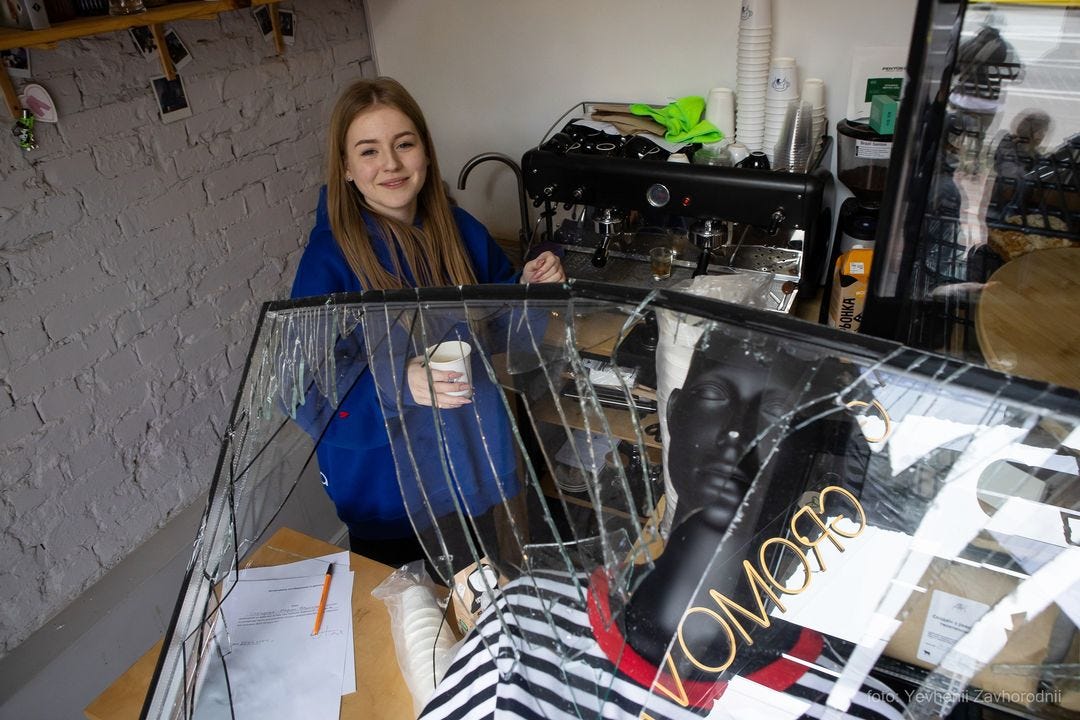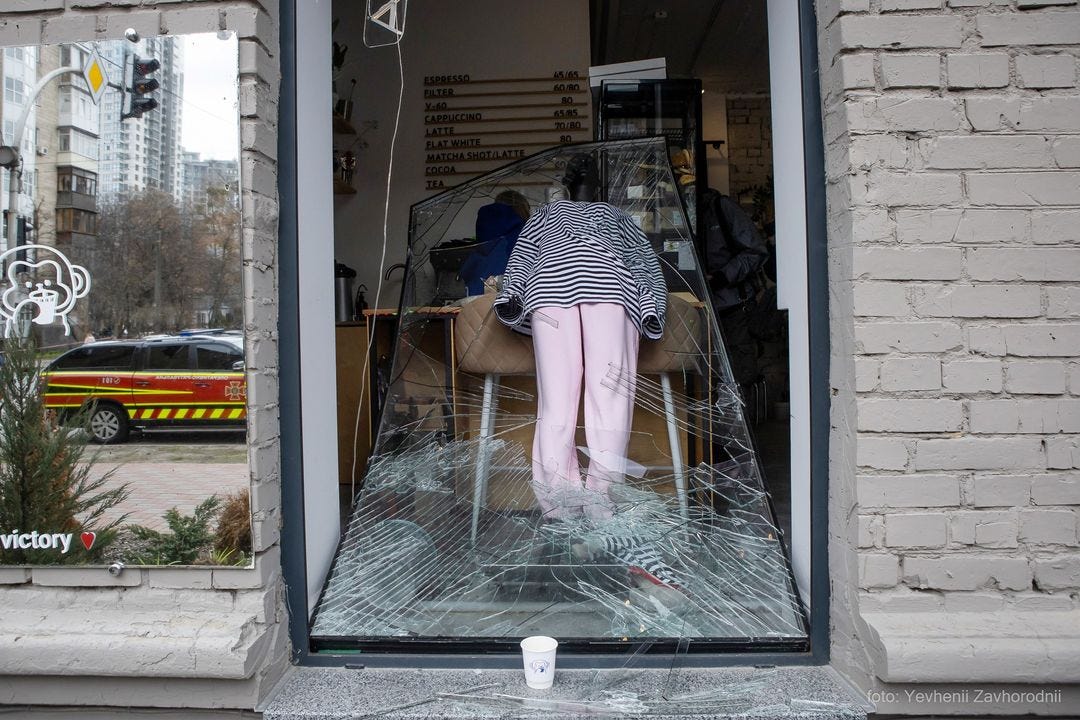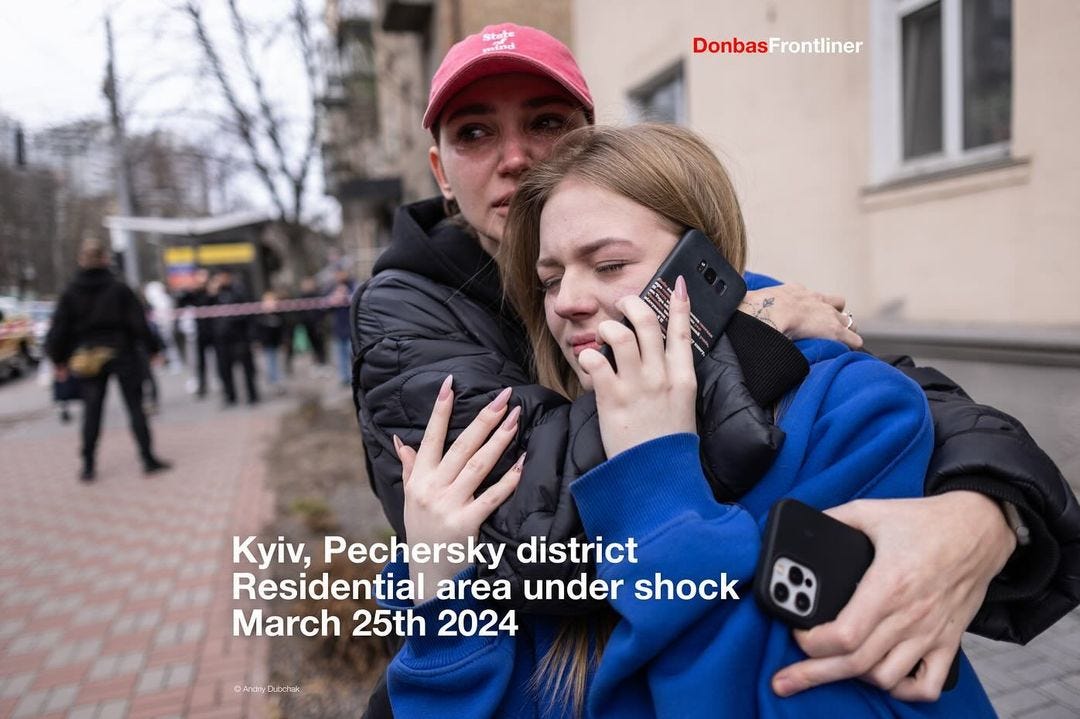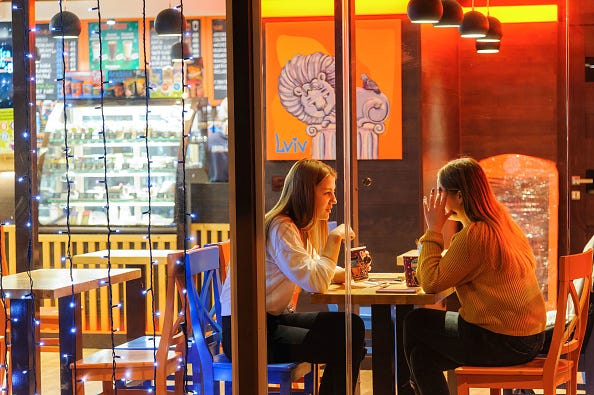Editor’s Note: We will cover every element of the war. Ukraine is so much more than just lines on a map. We focus on the human stories to illustrate the news: culture, military, cuisine, music — that’s The Counteroffensive’s mission. Upgrade now to follow along!

It’s a cold early spring morning in Kyiv – March 25th, 2024.
At 10:25 a.m. two women enter Maria's cafe and order coffee. Maria is making espresso when she hears the first explosion.
Later, the air raid siren goes off. Maria decides to finish her coffee and move to a safer place.
But she doesn't have time...
At 10:29 a.m. there is another terrible explosion. A window in the café is blown out and shards fall on her. Maria immediately crouched down and covered her head with her hands. The only thing that saves her from the broken glass is that she was wearing a thick, warm hoodie.
She did the only thing she knew to do: She stood behind the bar and started making coffee again.
After the paywall: a video showing the moment of the explosion, and a deep dive into Ukraine’s emerging (and quickly growing!) wartime coffee culture.
Video showing the moment of explosion:
Coffee culture in Ukraine is more than just a habit.
In times of political change, coffee has become a symbol of resilience and unity: from discussions about the country's future in coffee shops during the Revolution of Dignity to mobile coffee shops on the front lines.
The rapid growth of coffee shops, artisan roasters and local brands reflects the country's openness to new ideas and its desire to develop even in difficult times.
Coffee was first brought to Ukraine through Lviv at the end of the 18th century, then a major trading city in the Polish-Lithuanian Commonwealth. Lviv's coffee shops were among the first in Europe, paving the way for coffee to spread throughout modern Ukraine. The first independent coffee shop opened in Lviv in 1829. It was called the ‘Vienna’ coffee shop.
After the Second World War and during the Soviet era, coffee was a more limited commodity, but remained popular, especially in the form of the powdered root of the chicory plant due to the shortage of real coffee.
With Ukraine's independence, the coffee market opened up to foreign competition and imports. Coffee culture has become more diverse with the emergence of numerous international and local coffee shops.
There are around six thousand coffee shops in Ukraine. Interestingly, during the full-scale war, the number of coffee shops in Ukraine has increased by 35 percent.
Maria Yevsstafieva came to Kyiv in 2022 after entering the university to study journalism. Almost immediately she realized that she wanted to ask her parents for less money, so she started looking for a job. Maria imagined it would be something in the catering industry. It didn't require any special skills and was easy to combine with her studies.
So Maria found a job as a barista, but she actually had to perform the duties of a barista, a waitress, a cleaner, and a florist. She stayed there for a couple of months.

And then she practically found her dream job. She was also a barista, but at a third-wave coffee shop called the Macaco Cafe. Third-wave coffee shops are places that use high-quality beans and professional equipment to popularize coffee culture. These cafes have an individual approach to preparing drinks and offer customers alternative coffees.
"I was interested in learning what roasts are, all the different Ethiopian and Colombian roasts and how they differ, and drawing latte art," Maria said.
Like in the United States and Canada, asking someone to go for a coffee is shorthand for asking them to get together.
"It is as if everyone can choose their own coffee at home. Going somewhere and having that coffee made for you, maybe watching other people, is a kind of ritual. And it adds such stability to your life. We feel more secure when we have a routine. And it gives us so much support," said psychologist Yana Hryvchuk.
But unlike in North America, it’s common for Ukrainians to drink coffee in the evening, because Ukrainians really like the taste of coffee. They don't drink it just to wake up, but just to enjoy it. And they don't care what time it is.
It’s also a cost-effective alternative to meet up with friends.
“We do live in a very poor country. It's cheaper to get a coffee [in the evening] than a meal at a restaurant. I guess that's the easiest explanation there can be," said Yaroslav Druzyk, the former editor in chief of The Village, a Kyiv lifestyle publication.
Regardless of the time of day, Maria loved the job – the way she made coffee, her relationship with management, and her regular customers.
But her particular café was hit during the Russian attack in March 2024.
There are no bomb shelters nearby, so there was a rule that if a major attack was underway, the cafe would open after the alarm. On that ominous day, everything was quiet, so Maria opened as usual.
The explosions happened very suddenly, even before the alarm was sounded. There was no time to hide.
In just a few minutes, rescuers and paramedics arrived on the scene. At first, they did not let anyone in, not even the residents of the buildings: they were afraid that the building was in a state of disrepair and might collapse.

Meanwhile, Maria tried to call the owners of the cafe.
"When I finally got through to them, they were shocked and probably just teleported to the cafe. They were there within five to ten minutes," Maria said.
All of her friends and regular customers started calling and texting her.
Maria's phone could not handle the load.
"I went out and bought a new phone two days later," Maria recalls with a laugh.

While clearing the rubble, one of the rescuers approached the café and asked for coffee. At first Maria and the owner, Andrii were confused, but then they remembered that the coffee shop had a coffee filter that would make 4-5 cups.
Inside the cafe, everything was in ruins, with pieces of glass and pennies lying everywhere, which people put into a jar as a small tip. Everyone who was around began to clean up and dismantle the wreckage.
Maria was still in shock and was given a sedative.
Although the cafe itself was a mess, the equipment was intact. So Andrii decided to make coffee and give it to the people for free.
People refused the complimentary coffee, and began to pay. Soon, there were so many people that he could not keep up.
"We have never had so many people in the coffee shop," Maria said.
So she started helping Andrii, mostly to distract herself. She worked the whole shift there, until 7 pm.
"Andrii came to me and said: 'Go have a smoke, relax, I'll do your shift. I went outside, took an iqos [a vape-like device], it was raining a little bit. And I sat down, leaned my back against the door and just thought about what had happened. And I started to cry, because somehow I hadn't cried all this time, and I realized that it could have been very bad," Maria said with a smile on her face.
But it was not the situation itself that shocked her the most, but the outpouring of support.
"People I don't know, who don't know me personally, foreigners, wrote me all kinds of nice things. They sent me gifts, goodies, some cosmetics as a sign of support. I would come home with these packages. I stood in front of the dormitory and cried for half an hour because I was not expecting this," Maria said.
Maria no longer works at the café, but she still remembers it fondly. Especially when she goes there for coffee. The coffee shop is operating as usual, and the window has already been replaced.

Ukrainians have a special perception of coffee because of the war: it is a safe place where we can feel that we are in the life we had before the full-scale invasion. We forget ourselves and can live in the pre-war rhythm.
Barista Maria believes that coffee drinking is fashionable in Ukraine. That's why when something new comes out, Ukrainians are quick to try it, even if it's tasteless or bitter, as is the case with filter coffee.
Yana, the psychologist, emphasizes that this may also be because Ukrainians like to be in company - while drinking coffee, they communicate, and share experiences, and this is how they alleviate their worries despite the war.
Want to support our human interest reporting? Show your appreciation by hitting our tip jar. Funds go towards helping get cold weather gear and batteries for our team.
NEWS OF THE DAY:
Good morning to readers; Kyiv remains in Ukrainian hands.
MOSCOW STRUCK BY LARGEST DRONE ATTACK TO DATE: Moscow was attacked by upwards of 34 “airplane-type" drones, reports Reuters. One person was injured and dozens of flights were diverted from three Moscow airports. 36 drones were also shot down in other parts of western Russia according to the defence ministry. In conjunction with this, Russia launched 140+ drones towards Ukraine last night, with Kyiv able to down 62 of them.
50,000 RUSSIANS AND N. KOREANS ASSEMBLE NEAR KURSK: A recent US assessment states that Russia has amassed 50k soldiers to take back Ukrainian gains in Kursk, reports NYT. A major attack involving North Korean troops is expected in the coming days as missile strikes and artilley fire ramps up on Ukrainian positions, per Ukrainian officials. Russia has been able to slowly amass this force without drawing significant resources from other fronts.
POLISH PM PLANS MEETINGS WITH ALLIES AFTER US ELECTION: Polish PM Donald Tusk referred to Trump's reelection as "a serious challenge for everyone" and plans new meetings with NATO, EU, and UK allies, reports Politico.
"This new political landscape is a serious challenge for everyone, especially in the context of a possible end to the Russian-Ukrainian war," Tusk said. Worries remain that a decision will be reached by the U.S. and Russian presidents without Kyiv's involvement.
CATS OF CONFLICT:
Today’s cats of conflict are two little kitties that Mariana’s neighbors are feeding up as winter approaches.
Stay safe out there.
Best,
Myroslava





